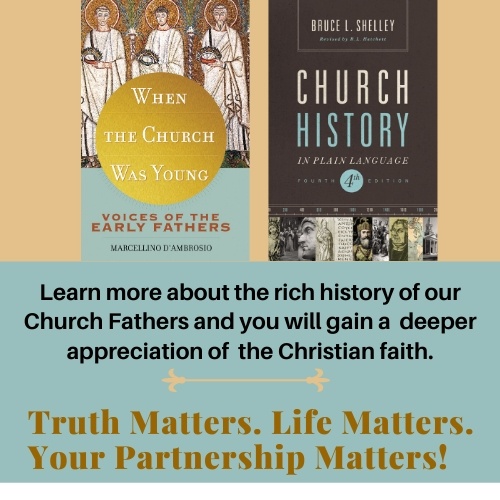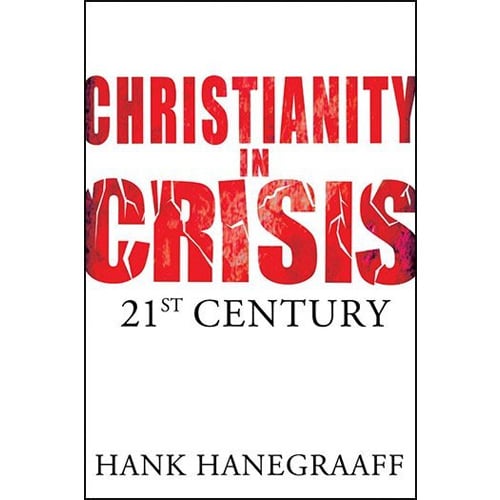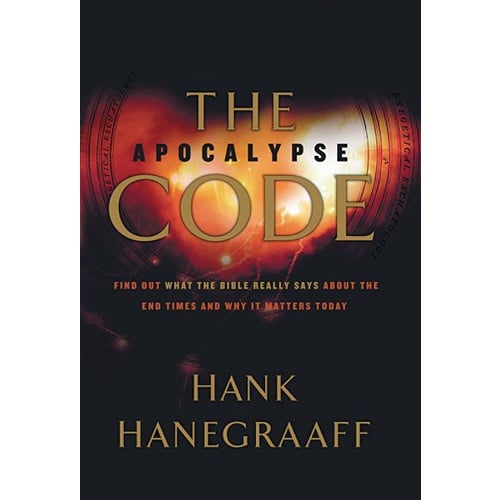CRI Resource: When the Church Was Young: Voices of the Early Fathers and Church History in Plain Language: Fourth Edition
Dear Hank: Deepening and strengthening our spiritual roots is essential if we’re to stand against the assaults on faith that are mounting daily in our post-truth culture. Please send me:
Description
Description
When the Church Was Young:
Voices of the Early Fathers
by Marcellino D’Ambrosio
From the cover…
If the word trinity isn’t in Scripture, why is it such an important part of our faith? And if the Bible can be interpreted in many ways, how do we know what to make of it? And who decided what should be in the Bible anyway? The Church Fathers provide the answers. These brilliant, embattled, and sometimes eccentric men defined the biblical canon, hammered out the Creed, and gave us our understanding of sacraments and salvation. It is they who preserved for us the rich legacy of the early Church. D’Ambrosio dusts off the dry theology and brings you the exciting stories and great heroes such as Ambrose, Augustine, Basil, Athanasius, Chrysostom, and Jerome. This page-turner will inspire and challenge you with the lives and insights of these seminal teachers from when the Church was young.
Long before the schism between East and West, Protestant and Catholic, long before the words catholic, orthodox, and evangelical referred to communities distinct and separated from each other, the Fathers of the Church gloried in the one faith of the united Body of Christ, which can be none other than evangelical, catholic, and orthodox.
It is time to rediscover our common inheritance. By returning to the days when the Church was young and exploring our roots together, we will experience new growth that will produce new fruit, new unity, and great joy.
The Mind and Heart of Ignatius as He Marched Toward Martyrdom (died c. 110)
This man is a man passionately in love with Jesus Christ. Three hundred years after Ignatius’s death, the great preacher John Chrysostom described Ignatius as “a soul seething with divine eros.” All seven of Ignatius’s letters are compelling. But the most moving is his letter to the church of Rome. In it, he begs the Roman Christians not to interfere with his martyrdom through some misguided love. “I am voluntarily dying for God — if, that is, you do not interfere. I plead with you, do not do me an unseasonable kindness. Let me be fodder for wild beasts — that is how I can get to God. I am God’s wheat and I am being ground by the teeth of wild beasts to make a pure loaf for Christ.”
From Sabbath to Lord’s Day
The same group of Judaizers who denied Christ’s divinity insisted on worshipping God on the Sabbath, as commanded by
Moses. To them, Ignatius responds that it was the apostles, all raised as Jews, who transferred the weekly day of celebration
from the Sabbath (Saturday) to Sunday, the first day of the week, because this was the day of the Lord’s resurrection. Here we
find the earliest explicit testimony to the apostolic origin of Sunday worship and the meaning behind it.
The Prayer of Polycarp (died c. 156)
Polycarp was tied to the stake, and Pionus recorded for us the prayer he uttered before the execution began:
“Lord God Almighty, Father of thy beloved and blessed Servant Jesus Christ, through whom we have received full
knowledge of thee, ‘the God of angels and powers and all creation’ and of the whole race of the righteous who live in thy presence: I bless thee, because thou hast deemed me worthy of this day and hour, to take my part in the number of the martyrs, in the cup of thy Christ, for ‘resurrection to eternal life’ of soul and body in the immortality of the Holy Spirit; among whom may I be received in thy presence this day as a rich and acceptable sacrifice, just as thou hast prepared and revealed beforehand and fulfilled, thou art the true God without any falsehood. For this and for everything I praise thee, I bless thee, I glorify thee, through the eternal and heavenly High Priest, Jesus Christ, thy beloved Servant, through whom be glory to thee with him and Holy Spirit both now and unto the ages to come. Amen.”
This prayer is remarkable, for it is almost certainly an adaptation of the prayer that Polycarp had prayed over the Eucharist
on each Lord’s Day. It is valuable because it is one of the earliest examples of such a prayer and because it also makes clear
that both martyrdom and the Eucharist have something in common — they both put us in touch with the one sacrifice of
Christ and invite us to enter into that sacrifice.
Justin Martyr’s Ultimate Act of Witness (died 165)
Rusticus (the prefect of the city of Rome): Listen, you who are said to be eloquent and who believes that he has the truth: if I have you beaten and beheaded, do you believe that you will then go up to Heaven?
Justin: If I suffer as you say, I hope to receive the reward of those who keep Christ’s commandments. I know that all who do that will remain in God’s grace even to the consummation of all things.
Rusticus: So you think that you will go up to Heaven, there to receive a reward?
Justin: I don’t think it, I know it. I have no doubt about it whatever.
Rusticus: Very well. Come here and sacrifice to the gods.
Justin: Nobody in his senses gives up truth for falsehood.
Rusticus: If you don’t do as I tell you, you will be tortured without mercy.
Justin: We ask nothing better than to suffer for the sake of our Lord Jesus Christ and so to be saved. If we do this, we can stand confidently and quietly before the fearful judgment-seat of that same God and Savior, when in accordance with divine ordering all this world will pass away.
Rusticus: (rising to his feet) “Let those who have refused to sacrifice to the gods and to yield to the command of the emperor be scourged, then let them be led away and beheaded, according to the laws.
Ten years after Polycarp gave his final witness, Justin gave his final lecture.
Truths-in-Tension: God, Infinite and Transcendent…
If he is truly infinite and transcendent, the truth about God cannot be fully grasped by the finite human mind. As Augustine
would say… “what you understand can’t possibly be God.” God cannot be solved as if he were a math problem or mastered,
once and for all, like a crossword puzzle. The work, and even more, the very nature of God, cannot appear to the human
mind as anything short of mystery. This mystery typically presents itself to us as a series of paradoxes. God is one, yet God
is three. Jesus is human, yet Jesus is divine. These paradoxes are truths-in-tension; they strain the brain and summon the
human mind to bow in awe and worship.
Heresy arises when thinkers, annoyed by this tension, seek to relax it by eliminating one of the seemingly contradictory
truths. Impatient with mystery, heresy seeks to dominate it. Making a choice of one or the other side of the paradox, heresy
attempts to rationalize what is beyond human reason.
The Chambers of Nicaea…
It wasn’t just emperors and bishops who had occupied the council chambers at Nicaea. Several bishops had brought along
personal assistants who attended council sessions with their bishops. Bishop Alexander of Alexandria brought a youthful
secretary named Athanasius who also served as his advisor. This lad, still in his twenties, did not have the right to vote.
After all, he was just a deacon. But he undoubtedly left his mark upon the council, emerging as a champion of the Nicene
cause. He was a precocious young man who had something in common with the great sculptor Michelangelo: Each had
created a famous masterpiece soon after the age of twenty. In the case of the Italian sculptor, it was his renowned Pietà. In
the case of the deacon Athanasius, it was a short treatise called On the Incarnation, reckoned as one of the great theological classics of all time.
Church History in Plain Language: Fourth Edition
by Bruce Shelley
The fourth edition of Shelley’s classic one-volume history of the church brings the story of Christianity into the twenty-first century. This latest edition of the book takes a close look at the rapid growth of evangelical and Pentecostal Christianity in the southern hemisphere, addresses the decline in traditional mainline denominations, examines the influence of technology on the spread of the gospel, and discusses how Christianity intersects with other religions in countries all over the world.
This concise book provides an easy-to-read guide to church history with intellectual substance.
Features include:
- Includes contemporary developments related to the spread of the gospel
- Discusses how technology has an impact on how the church worships and grows
- Covers the explosion of Christianity in the southern hemisphere
Additional Info
Additional information
| May 2020 Resource | When the Church Was Young, Church History in Plain Language,, When the Church Was Young -AND- Church History in Plain Language |
|---|




